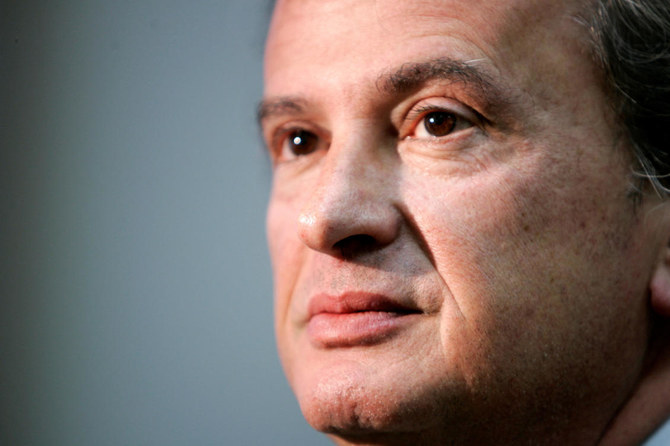BEIRUT: A preliminary forensic audit of Lebanon’s central bank by professional services firm Alvarez & Marsal has painted a damning picture of the institution under former Governor Riad Salameh.
Caretaker Finance Minister Youssef Khalil presented copies of the report on Banque du Liban to caretaker Prime Minister Najib Mikati, Parliament Speaker Nabih Berri and other lawmakers on Friday.
It comprises 332 pages in 14 sections and details complex accounting, banking and administrative operations.
The report comes after the US Treasury on Thursday announced sanctions on Salameh, as well as his son Nadi Salameh, brother Raja Salameh, assistant Marianne Howayek and friend Anna Kozakova.
Salameh was still in office when Alvarez & Marsal won the audit contract in 2021. He stepped down last month.
The report said that the financial engineering conducted by the former governor was “highly costly, with a total cost of 115 trillion Lebanese pounds ($7.7 billion) between 2015 and 2020.”
The balance sheet did not show any losses, according to the report. Instead they were recorded under the categories of “other assets” and “clearance and settlement accounts.”
No explanation was provided for the payment of interest to major depositors and borrowers.
The central bank resorted to issuing bonds and printing money, resulting in increased government spending and causing an inflation issue that affected its ability to stabilize the rate of change, the document said.
In its preliminary findings, the report revealed that transfers to the account of Forry Associates Ltd. — owned by Raja Salameh and the subject of European judicial inquiries into possible corruption — totaled $333 million, including $111 million in illegal transfers.
Civil movements have blamed Lebanon’s economic collapse since 2019 on the failure of successive governments and the financial engineering pursued by Salameh.
The report said that the value of loans granted by the central bank totaled 15 trillion Lebanese pounds and that 23 individuals, entities and associations had unjustly benefited from financial support exceeding $100,000 each between 2015 and 2020.
As a result of the unconventional standards adopted by the central bank and its manipulation of accounts, its deficit rose to 77 trillion Lebanese pounds in 2020, the report said.
It said also that while the bank had a foreign currency surplus of $7.2 billion at the end of 2015, by the end of 2020 that had become a deficit of $50.7 billion.
The rapid deterioration of the bank’s financial situation was not reflected in its balance sheet and financial statements, as its use of unconventional accounting standards allowed it to exaggerate the value of its assets and profits, the report said.
The document also revealed minutes from a meeting of the bank’s central council that showed how Salameh shaped monetary policy, established accounting standards that concealed accumulated losses, and determined which banks would benefit from loans and financial engineering.
Members of the central council did not challenge those decisions or oversee the related details, it said.
The report said that the unconventional policies applied by the central bank included: “Deferral of interest costs to increase profitability; creation of seigniorage balances to offset part of the deferred costs of matured CDs and pain coupons on outstanding instruments to increase profitability; overstating the carrying value of the Lebanese treasury bills by not recognizing the impairment in their value; recording of unrealized appreciation/(depreciation) of gold balance sheet resulting in understatement/(overstatement) of assets and equity; offsetting the Ministry of Finance’s US dollar overdraft liability to the central bank against treasury LBP deposits resulting in an understatement of both assets and liabilities; and offsetting the loans and deposits under leverage agreements resulting in an understatement of both assets and liabilities.”
The report also addressed the attraction of foreign deposits and their conversion into local assets. It found that a substantial portion of foreign currency assets were, in reality, local assets and said that if these amounts were to be returned, they would exert immense pressure on the Lebanese state, people and economy.
The report said that at the end of each year, the governor directed the accounting department to offset financial transaction expenses. Consequently, the financial data released did not accurately portray the bank’s true financial position.
“The positions and losses of BDL are presented through netting of assets and liabilities and through recording them in unexplained and general accounts such as ‘other assets’ and ‘clearance and settlement accounts,’” the report said.
“No loss is shown at all in the balance sheet,” it added, noting that no information was provided to the public, such as profit and loss accounts from 2015 to 2020, interest paid to major depositors or granted to major borrowers, or the methodology for reporting those interests.
Also, details such as deposit segmentation were withheld, as were the costs of financial engineering and related decisions, the report said.
Instead, the central bank resorted to monetization to increase the supply of the Lebanese pound, leading to an increase in the country’s overall expenditure.
The report said that central banks might sometimes engage in such activities, but an increase in those operations created an inflation problem and affected the ability to stabilize the exchange rate.
It said the central bank also used financial engineering to keep US dollars within the banking system but once the phase of exchange rate stabilization ended, the approach of profiting from monetization became unconventional and unstable.
The rise in the value of the Lebanese pound led to economic growth, especially in sectors that earned profits in foreign currency, the report said.
The use of monetization was not entirely prudent and not disclosed to the public, it said.


























